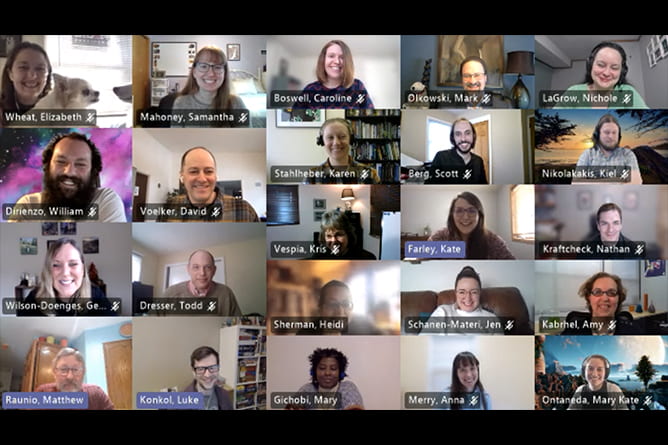Each January the UW-Green Bay Center for the Advancement of Teaching and Learning and the Instructional Development Council host the Instructional Development Institute, a conference for faculty and staff that promotes the continued development and application of best practices for teaching and learning. The conference was held virtually this year on Jan. 19 and 21 and consisted of a variety of synchronous and asynchronous presentations that explored this year’s theme, “Making Meaningful Connections”. UWGB staff and faculty made up the largest portion of presenters and attendees, though we also had individuals outside of UWGB both present and attend.
Troubling Connections: Five Lenses for Teaching Toward Justice, a presentation by our keynote speaker, Dr. Kevin Kumashiro, was perhaps the most popular session this year. The session explored fives lenses for understanding and making meaningful connections in higher education with an emphasis on how we might re-imagine and democratize education to work toward equity and justice. These five lenses are: 1) naming the moment, 2) curriculum as intervention, 3) contradictions of teaching, 4) learning through crisis, and 5) movement building as a frame. Dr. Kumashiro presented each lens one by one, providing both real world examples and citations for the philosophy behind them. Many attendees commented on how they were invigorated by the presentation, with some opting to dive deeper into these five lenses in a follow-up workshop later that afternoon.
Another standout session was The UWGB Land Acknowledgment: How to Meaningfully and Respectfully Recognize Wisconsin’s First Nations. The panel, comprised of several First Nations community members and instructors that teach in related studies, gave an overview of the First Nations people groups that once resided on the land our university now occupies. Attendees were encouraged to reflect on the importance of learning about and publicly acknowledging First Nations’ history. Our panelists offered several concrete suggestions for making the land acknowledgement a more regular part of our activities both for the university at large and within our individual classrooms.
The session Student Perspectives of Learning in a Pandemic, a live Q & A with a panel of five UWGB students and the Dean of Students, Mark Olkowski, also had high attendance. The panelists addressed instructor questions, offering honest feedback on topics like group work, discussions, virtual classroom settings, and instructor communication. The students often acknowledged the challenge of balancing academic rigor with a necessary level of flexibility to meet student needs during a pandemic when making their suggestions. The ability to honestly and openly engage with our students about teaching was a valuable experience for panelists and participants alike and we have already received requests to include student panels at future conferences.
In addition to these and many other live sessions, the Institute also included asynchronous “on-demand” sessions this year that span a range of topics from course accessibility to assessment of teaching. These asynchronous sessions come in the form of pre-recorded videos, PowerPoint presentations, and Canvas pages, paired with interactive elements like quizzes and discussions. During a time when it is understandably difficult to coordinate events synchronously, we were excited to have an opportunity to include more submissions in this way and hope to continue offering asynchronous options in the future.
If you were unable to attend this year, or attended but missed some of the sessions, it’s not too late to partake in what the Institute has to offer. Session recordings and other asynchronous content are now accessible in the Canvas course and will remain there until the end of spring semester. We highly encourage you to continue engaging with the materials there as you have the time and space. Consider also posting a comment or question in the session discussion boards to show support to your colleagues and contribute to these important conversations.
The Instructional Development Institute was made possible in great part through the hard work and participation of many of our faculty, staff, and students, so a huge “thank-you” to all that contributed to making this year’s conference a success. We very much enjoyed our time together and hope that you continue “making meaningful connections” in all that you do!


